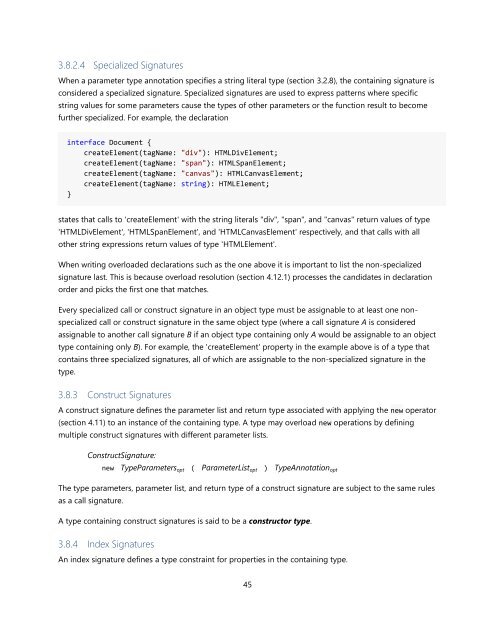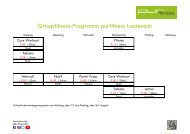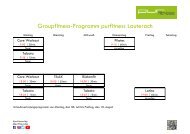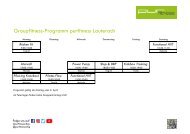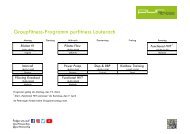TypeScript Language Specification v1.5
TypeScript Language Specification v1.5
TypeScript Language Specification v1.5
Create successful ePaper yourself
Turn your PDF publications into a flip-book with our unique Google optimized e-Paper software.
3.8.2.4 Specialized Signatures<br />
When a parameter type annotation specifies a string literal type (section 3.2.8), the containing signature is<br />
considered a specialized signature. Specialized signatures are used to express patterns where specific<br />
string values for some parameters cause the types of other parameters or the function result to become<br />
further specialized. For example, the declaration<br />
interface Document {<br />
createElement(tagName: "div"): HTMLDivElement;<br />
createElement(tagName: "span"): HTMLSpanElement;<br />
createElement(tagName: "canvas"): HTMLCanvasElement;<br />
createElement(tagName: string): HTMLElement;<br />
}<br />
states that calls to 'createElement' with the string literals "div", "span", and "canvas" return values of type<br />
'HTMLDivElement', 'HTMLSpanElement', and 'HTMLCanvasElement' respectively, and that calls with all<br />
other string expressions return values of type 'HTMLElement'.<br />
When writing overloaded declarations such as the one above it is important to list the non-specialized<br />
signature last. This is because overload resolution (section 4.12.1) processes the candidates in declaration<br />
order and picks the first one that matches.<br />
Every specialized call or construct signature in an object type must be assignable to at least one nonspecialized<br />
call or construct signature in the same object type (where a call signature A is considered<br />
assignable to another call signature B if an object type containing only A would be assignable to an object<br />
type containing only B). For example, the 'createElement' property in the example above is of a type that<br />
contains three specialized signatures, all of which are assignable to the non-specialized signature in the<br />
type.<br />
3.8.3 Construct Signatures<br />
A construct signature defines the parameter list and return type associated with applying the new operator<br />
(section 4.11) to an instance of the containing type. A type may overload new operations by defining<br />
multiple construct signatures with different parameter lists.<br />
ConstructSignature:<br />
new TypeParameters opt ( ParameterList opt ) TypeAnnotation opt<br />
The type parameters, parameter list, and return type of a construct signature are subject to the same rules<br />
as a call signature.<br />
A type containing construct signatures is said to be a constructor type.<br />
3.8.4 Index Signatures<br />
An index signature defines a type constraint for properties in the containing type.<br />
45


